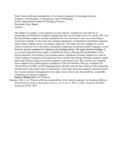| dc.description.abstract | The debate on surging e-waste amounts in some African countries has seen the ban of importation of refurbished computers arguing that they are the main source of e-waste. The view that refurbished computers are bad contradicts the view that reuse is one way of diverting ewaste from landfills. At the same time banning importation of affordable refurbished computers denies needy children access to computer education. This paper presents findings of a study whose overall aim was to develop a sustainable computing assessment model to manage e-waste from low priced computers for learning in developing nations. The paper presents findings of two research questions that sought to establish the factors affecting the sustainability of low priced computers for learning in developing nations. Qualitative research method was used in which computer instructors and technicians from schools and colleges offering computer studies education in Kenya using low priced computers were interviewed. The schools were sampled from computers for schools projects databases of the Government of Kenya, computers for schools Kenya (CFSK) and NComputing Kenya. Results indicate that contrary to the notion that obsolescence is the major cause of increasing e-waste from personal computers, physical failure due to poor computer management is the major course. Keywords: Sustainability, sustainable computing, low priced computers | en_US |

